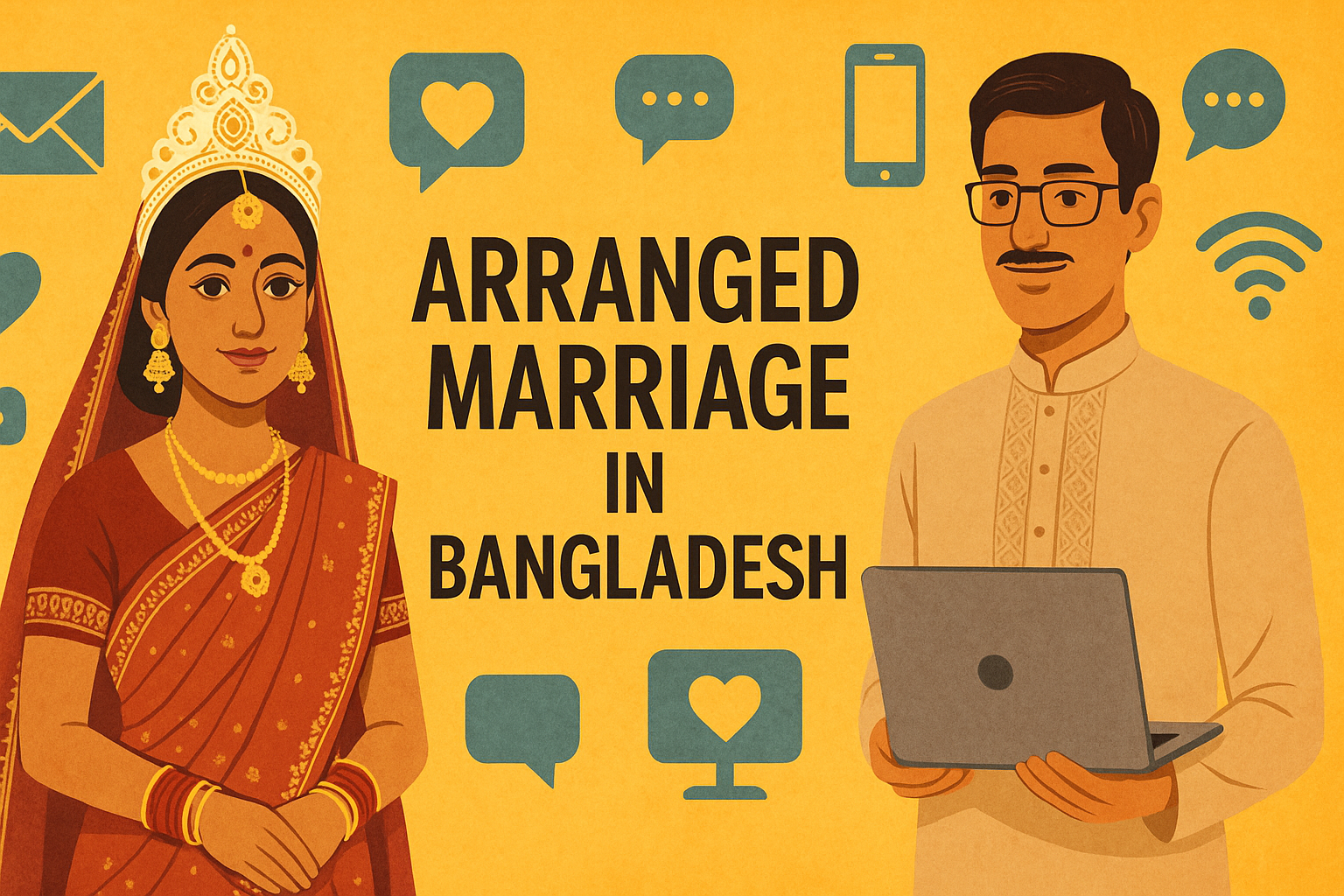
Arranged Marriage in Bangladesh: Evolving Traditions in a Digital Age
Ah, the timeless tale of arranged marriages in Bangladesh —
an age-old institution that has seen more plot twists than a Bangla natok. Once
defined by aunties with photo albums and tea-stained biodatas, the tradition is
now dancing to the rhythm of Wi-Fi and wedding hashtags. Welcome to the world
where tradition meets Tinder — or, well, something like it.
A Brief Look Back: The Traditional Arranged Marriage
In Bangladesh, arranged marriages have long been the norm.
Families played matchmaker, vetting potential brides and grooms for
compatibility based on education, family background, and of course,
astrological charts (shubho rashifol, anyone?).
Weddings were less about "falling in love" and
more about falling in line — with culture, family expectations, and social
obligations.
But Wait — Things Are Changing
Fast forward to 2025, and things are looking a bit
different.
No, families haven't been completely sidelined. But young
people are taking more initiative. Compatibility now includes shared Netflix
preferences, not just horoscopes. And yes, there’s a lot more swiping involved
than swiping rosogolla at the biyer dawaat.
Technology: The New Matchmaker
Apps like MarriageChime, Biyeta, MatrimonyBD, and even global
giants like Bumble and Facebook Dating are slowly reshaping how
Bangladeshis meet their future spouses.
Here’s how digital matchmaking is spicing things up:
- Algorithms
> Aunties: Instead of “your uncle’s colleague’s daughter’s cousin,”
matches are now filtered by interests, education, and values.
- Profiles
& Privacy: Youth are creating detailed profiles and chatting
before agreeing to meet — sometimes even without parental knowledge
(shhh!).
- Hybrid
Matches: Increasingly, couples are meeting online but still go through
traditional engagement and marriage rituals.
The Family Factor (Still a Big Deal)
Despite all the modern upgrades, families in Bangladesh
still play a crucial role in marriage decisions. However, the conversation has
shifted:
- Parents
are now screening profiles online.
- There’s
more negotiation than imposition.
- Young
adults often get a say in the final decision — unheard of two decades ago.
Love in the Time of Wi-Fi
One of the most heartwarming shifts? The rise of love within
arranged marriages.
Couples are now chatting, dating (with a curfew!), and even
taking premarital compatibility tests. Love doesn’t always have to precede
marriage — but it’s no longer missing from the equation.
Gender Roles: Rewriting the Script
Once upon a time, the bride’s education mattered just enough
to make her a good conversationalist. Today?
- Women
are choosing careers before marriage.
- Men
are expected to be emotionally available (slowly but surely).
- Equality
is becoming part of the checklist — alongside complexion and cooking
skills (we’re working on it!).
Challenges in the Modern Age
Not all that glitters is gold-plated rickshaw decor:
- Catfishing
& Fake Profiles: Just like with any online platform, not every
profile is what it seems.
- Parental
Pressure Still Exists: Many still face ultimatums disguised as gentle
nudges.
- Urban
vs Rural Divide: While Dhaka is dating digitally, many rural areas
stick to more traditional methods.
What’s Driving the Change?
Several factors are pushing the evolution:
- Access
to the internet and smartphones
- Higher
levels of education, especially among women
- Exposure
to global cultures via social media and TV
- Shifting
economic priorities — marriage is no longer the only goalpost in life.
Real-Life Stories: From Online to “I Do”
Take Nusrat and Fahim — she was in Sylhet, he in Chattogram.
They met on a Bangladeshi matrimonial app, exchanged memes for a month, met at
a family event, and tied the knot six months later.
Stories like theirs are becoming increasingly common — love
stories born out of both algorithms and blessings.
The Role of Culture & Religion
Islamic customs still shape many arranged marriages in
Bangladesh, but interpretations are becoming more flexible. Nikahs are now
being streamed on Zoom, and even conservative families are embracing virtual
milon-melas.
Are Arranged Marriages Dying Out?
Absolutely not. They're evolving, not vanishing. Many
still prefer arranged marriages for the support system and shared values they
offer. What’s changing is how matches are made — not why they matter.
Looking Ahead: What Will 2030 Look Like?
- Matchmaking
AI?
- VR
milon mela?
- Parents
liking each other’s profiles?
Anything’s possible. But one thing is certain: the arranged
marriage tradition in Bangladesh isn’t going anywhere — it’s just getting a
tech-savvy glow-up.
Final Thoughts
From handwritten biodatas to Google Docs, and from
chaperoned meetings to Zoom tea parties — arranged marriages in Bangladesh have
come a long way. And while our customs continue to root us, our screens are
helping us branch out.
So whether you meet through your mamoni or match on an app,
remember — love, respect, and understanding are still the real matchmakers.
FAQs
1. Are arranged marriages still common in Bangladesh?
Yes, arranged marriages remain widely practiced, though they’re adapting to
modern values and digital tools.
2. What’s the biggest change in arranged marriages today?
The involvement of technology and increased agency for the couple, especially
in urban areas.
3. Are dating apps culturally acceptable in Bangladesh?
While still a bit taboo for some, platforms like MarriageChime, Biyeta and MatrimonyBD are
gaining acceptance among families.
4. Can someone reject an arranged marriage proposal now?
Absolutely. Today’s generation is more empowered to say “no” or ask for
alternatives.
5. What role do families play in digital arranged
marriages?
They often help screen profiles, initiate conversations, or even browse
platforms together with their children!